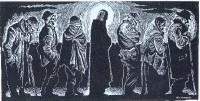

Karen House Catholic Worker
 |
Karen House Catholic Worker |
The RoundTable If We Work for Peace, We Must Stop Paying for War Winter 1984 Major Articles
|
Download Entire Issue by Clicking Image Above (large file - it takes a minute!) |
|||
Karen House: 1840 Hogan St. Saint Louis, MO 63106 Contact Us: 314.621.4052 |
Regular Features
|
Why This Issue: A Parable Once, in a certain land, there were peasant villages on which napalm bombs fell; mines exploded along the paths and in the fields. Many of the villagers and their children were hurt and many killed. When it became known that the villagers were suffering, many Christians wondered who was responsible. A Quaker of good repute thought Congress was responsible and supported efforts to lobby the legislature to cut off funding for such bloodshed He himself continued to give money to Congress each year on April 15 because the law said it was required. A Catholic woman, daily communicant, thought upon the slaughter of innocent children and decided to pray each day for peace. She did not think about paying for the bombs and mines because the money was automatically taken out of her pay each week and sent to the government by her employer. A Mennonite was troubled in conscience because he knew his taxes were paying for bombs and mines. Thinking about the future, he gave vigorous support to the World Peace Tax Fund which would provide by law that he could elect for reasons of conscience that his taxes be used only for non-military projects. He looked forward in faith to the day when this law would provide solace for his conscience. A Baptist minister thought that the President was responsible and urged people to vote for a candidate who promised peace. Many in his congregation worked for companies making weapons; others were in the military; all were good, law-abiding citizens. The minister gave thanks to be shepherd of such a fine flock. An elder in a Hutterite community thought upon the evils of the war and recommended a relief effort to care for the families and the injured. He said “If we knew our taxes were going only for war, of course, we would not pay them. But what can we do? Some of our taxes go for good purposes too, like schools and roads. Besides, our religious life might be disrupted if we were not faithful to the government and obedient to its laws.” Now a young man, an atheist, his eyes and heart open to suffering, made a decision to refuse to pay for war. And when the war against the villages was over and the government increased the military budget by $4 billion and continued to build nuclear weapons, he also refused to pay for this. Which of these was neighbor to the villagers? -JOHN SCHUCHARDT |
The RoundTable is 24 pages long. To download, you'll need the most recent version of Adobe Acrobat. Download Adobe Acrobat 8 here (it's easy AND free!)
Search all of the RoundTable issues for an author, subject or title here: |